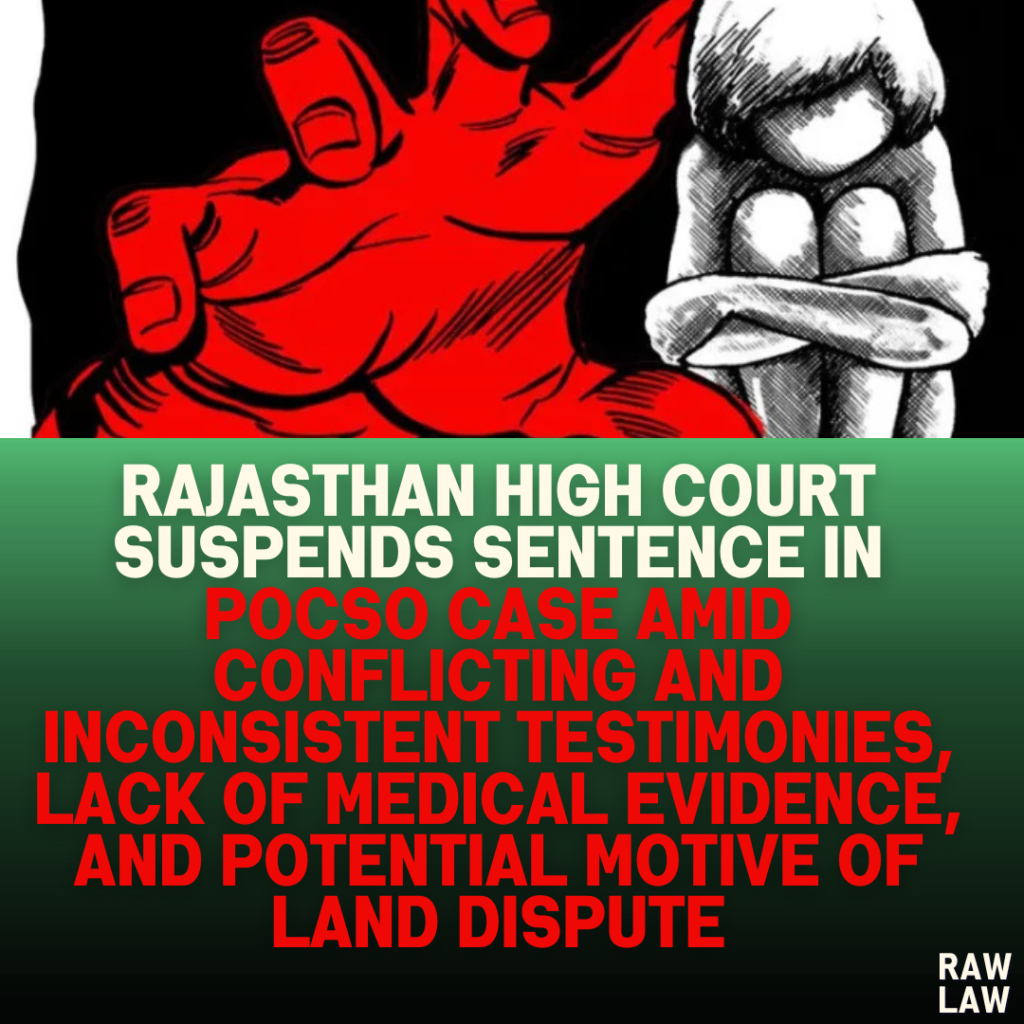Court’s Decision:
The Rajasthan High Court, in its order dated 09/10/2024, granted the application for suspension of the sentence filed by the appellant under Section 389 of the Cr.P.C. The appellant had been convicted under Sections 363 and 506 of the IPC and Section 3/4 of the Protection of Children from Sexual Offences (POCSO) Act, 2012. The court suspended the sentence, citing conflicting statements by the victim, lack of corroborating medical evidence, and the appellant’s compliance with bail conditions during the trial.
Facts:
The appellant had been convicted by the Special Judge under the POCSO Act, 2012, for allegedly committing sexual offenses against a minor. Initially, the victim accused three individuals of anal intercourse but later changed their testimony, accusing only the appellant. The medical examination did not find evidence of anal intercourse, leading the victim to again alter their statement in court, accusing the appellant of oral sex.
Issues:
- Whether the conflicting testimonies of the victim could be relied upon.
- Whether the lack of medical evidence supporting the allegations impacted the conviction.
- Whether the sentence should be suspended pending the appeal.
Petitioner’s Arguments:
The petitioner’s counsel argued that the trial court had wrongly convicted the appellant by failing to correctly assess the evidence. The defense emphasized the inconsistencies in the victim’s statements, including the shift from accusing three people to one, and the change from anal to oral intercourse allegations. It was further contended that the appellant had not misused his bail during the trial and had already served one year and seven months of imprisonment. The counsel also highlighted the ongoing land dispute between the appellant and the complainant, suggesting a motive for false allegations.
Respondent’s Arguments:
The state opposed the suspension of the sentence but conceded that no medical evidence supported the victim’s initial claim of anal intercourse. Despite this, the state maintained that the allegations against the appellant were serious.
Analysis of the Law:
The court analyzed the conflicting testimonies of the victim and the absence of medical evidence corroborating the serious charges. The court considered the legal principle that in cases involving serious offenses, especially those under the POCSO Act, the evidence must be clear and consistent to sustain a conviction.
Precedent Analysis:
The court referred to precedents where the conviction in serious offenses, such as those under the POCSO Act, was based on cogent evidence, including corroboration by medical reports, and consistent testimonies of the victim. The conflicting statements and lack of supporting evidence were key in determining the suspension of the sentence.
Court’s Reasoning:
The court observed that the victim had made different statements at different stages, and none of these allegations were supported by medical evidence. Additionally, the court took into account the land dispute between the appellant and the complainant, which might have motivated the false allegations. It also noted the appellant’s compliance with bail conditions and the length of his incarceration as factors supporting the suspension of the sentence.
Conclusion:
The court found that the appellant had strong grounds to challenge the conviction, particularly in light of the inconsistent testimonies and lack of medical evidence. As a result, the sentence was suspended, and the appellant was granted bail until the disposal of the appeal.
Implications:
This decision underscores the importance of consistent testimonies and corroborative evidence in serious criminal cases, particularly under the POCSO Act. It also highlights the court’s willingness to suspend sentences when significant doubts arise regarding the veracity of the evidence. This ruling could influence future cases where conflicting statements are at the heart of the conviction, particularly in sensitive cases involving minors.



